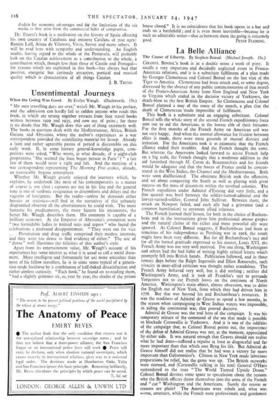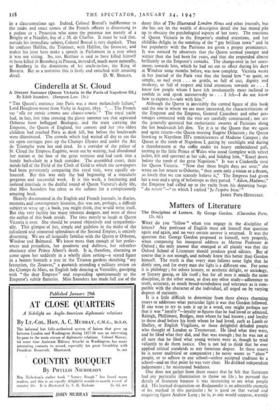La Belle Alliance
The Cause of Liberty. By Stephen Bonsai. (Michael Joseph. 15s.) COLONEL BONSAL'S book is in a double sense a work of piety. It recalls a very important and decidedly neglected event in Franco- American relations, and it is a substitute fulfilment of a plan made by Georges Clemenceau and Colonel Bonsal on the last visit of the Tiger to America. Clemenceau had been struck and, to some degree, distressed by the absence of any public commemoration of that march of the Franco-American Army from New England and New York to Virginia which ended in the decisive victory of Yorktown, the death-blow to the first British Empire. So Clemenceau and Colonel Bonsai planned a tour of the route of the march, a plan that the death of Clemenceau `made impossible of fulfilment.
This book is a substitute and an engaging substitute. Colonel Bonsai tells the whole story of the second French expeditionary force sent out to aid the Americans at the lowest ebb of their fortunes. For the first months of the French Army on American soil was not very happy. And when the normal allowance for friction between allies is made, there were extra grounds of mutual distrust and irritation. For the Americans took it as axiomatic that the French alliance ended their troubles. And the French thought the same. But whereas the Americans looked forward to active French help on a big scale, the French thought that a moderate addition to the aid furnished through M. Caron de Beaumarchais and his friends would be adequate and that the forces of France could be concen- trated in the West Indies, the Channel and the Mediterranean. Both were soon disillusioned. The obstinate British took the offensive, and set about conquering the South as well as playing with great success on the mass of discontent within the revolted colonies. The French expedition under Admiral d'Estaing did very little, and a fine quarrel was bred between the soldier-turned-admiral and the lawyer-turned-soldier, General John Sullivan. Between them, the attack on Newport failed, and each ally had a grievance (and a common humiliation) to envenom allied relations.
The French learned their lesson, for both in the choice of Rocham- beau and in the instructions given him professional amour propre and the natural claims of the richer and more powerful ally were ignored. As Colonel Bonsai suggests, if Rochambeau had been as tenacious of his independence as Pershing was in 1918, the result might have been very different. But for all Rochambeau's tact and for all the formal gratitude expressed to his master, Louis XVI, the French Army was not very well received. For one thing, Washington and others had the bad habit of writing highly critical letters which promptly fell into British hands. Publication followed, and in those remote days before the Ralph Ingersolls and Elliot Roosevelts, such vivacity in inter-allied criticism was thought rather scandalous. The French Army behaved very well, but it did nothing ; neither did Washington's Army, and it took all Franklin's tact to persuade Vergennes not to cut French losses on the continent of North America. Washington's main object, almost obsession, was to drive the English out of New York, from which they had driven him in 1776. But that was beyond his and Rochambeau's resources. It was the readiness of Admiral de Grasse to spend a few months, in the season when campaigning in West Indian waters was impossible, in aiding the continental war, that proved decisive.
Admiral de Grasse was the real hero of the campaign. It was his temporary seizure of the command of the sea that made it possible to blockade Cornwallis in Yorktown. And it is one of the oddities of the campaign that, as Colonel Bonsai points out, the importance of the defeat of Admiral Graves was not, at the moment, appreciated by either side. It was natural enough that Graves should not realise what he had done—suffered a repulse at least as disgraceful and far more important than that which cost Byng his life. But Admiral de Grasse himself did not realise that he had won a victory far more important than Galisonniere's. Clinton in New York made laborious preparations for relief, but the game was up. The British outworks were stormed, and (Cornwallis sulking in his tent) General O'Hara surrendered to the tune " The World Turned Upside Down." Colonel Bonsai devotes some space to speculation about the reasons why the British officers threw themselves into the arms of the French and " cut " Washington and the Americans. Surely the reason or reasons are plain? The Americans were rebels and, what was worse, amateurs, while the French were professionals and gentlemen
in a class-conscious age. Indeed, Colonel Bonsai's indifference to the ranks and exact names of the French officers is distressing to a pedant or a Proustian who notes the presence not merely of a Broglie or a Noailles, but of a M. de Charlus. It must be said that, outside his immediate subject, Colonel Bonsal is very slapdash. Thus he confuses Halifax, the Trimmer, with Halifax, the financier, and makes his joint hero make a speech in Parliament in a year when it 'was not sitting. So, too, Berthier is said to have killed himself or been killed in Bromberg in Prussia, instead of, much more naturally, at Bamberg in the dominions of his uncle-in-law, the King of Bavaria. But as a narrative this is lively and enriched with amusing



































 Previous page
Previous page